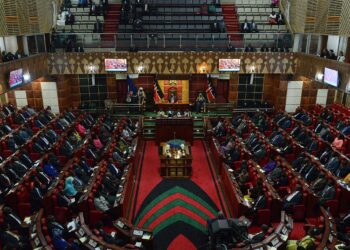The Chinese government banned cryptocurrency in 2021 in a bid to reduce financial risks and control money flow. However, mining pools in the country continue to wield significant influence over the Bitcoin network. As Ki Young Ju, founder and CEO of CryptoQuant, pointed out in a recent X post, these mining pools account for approximately 55% of the global Bitcoin hashrate, while U.S. mining companies represent around 40%.

Miners in China have persisted despite the ban, using advanced technologies like VPNs and decentralized networks to continue their operations without detection. The government responded by instructing law enforcement authorities to crack down on illegal mining, monitor IP addresses, and arrest those involved.
Recently, there has been speculation that the regulatory environment in Mainland China could shift. The government is showing an increased interest in blockchain technology, raising hopes that this could lead to a more favourable regulatory framework for cryptocurrency; Hong Kong, a semi-autonomous region of China, has adopted a much more crypto-friendly stance, which may influence future policies on the mainland.
Crypto-friendly regulatory changes may be on the horizon in Mainland China
Justin Sun, the founder of Tron, recently urged China to rethink its digital asset regulations and foster a competitive environment to maintain its global influence. He pointed out that competition between the U.S. and China could significantly benefit the crypto industry. Sun added that
This perspective has also been echoed by Zhu Guangyao, a former vice-minister of finance in China. According to the South China Morning Post, Zhu emphasized the importance of cryptocurrencies for digital economic growth at an economic forum in Beijing, calling for China to adjust its policies to match the U.S.’s growing involvement in the crypto sector.
Zhu is part of a rising number of Chinese economists or other stakeholders advocating for the government to review its ban on cryptocurrencies, especially as other countries expand their own crypto regulations.
Hope is building that Sun and Zhu’s vision for a more open crypto market in China could soon become a reality. Rumours of a potential policy shift gained momentum after a key ruling by the Shanghai No. 2 Intermediate People’s Court on September 25, 2024.
The court recognized Bitcoin as a legal digital currency, acknowledging its scarcity and functionality. While this ruling did not address Bitcoin trading or mining, it is seen as a significant development that could indicate a softening stance toward cryptocurrency regulation and maybe lifting the ban.
These rumours about lifting the ban are not new; in July 2024, Mike Novogratz, CEO of Galaxy Digital, mentioned on social media that he had heard hints about the potential easing of restrictions. His tweet attracted significant attention but also met with scepticism.
Although these rumours remain unverified, this is first time Bitcoin is recognized as a legal digital currency since the ban in China. The recent court ruling represents a significant development in the ongoing discussion about digital assets in the country.
Historically, the Chinese government has prioritized strict control over its financial system, viewing decentralized cryptocurrencies as a significant challenge to that control. Their focus on promoting the Digital Yuan clearly indicates a preference for state-controlled digital currencies rather than decentralized options.
However, the pressure of global market competition might compel China to reconsider its stance on cryptocurrencies. Recent initiatives show the country’s ambition to become a leader in blockchain technology and financial technology (fintech), which suggests a potential pathway toward a more balanced approach to digital assets.
Rather than completely lifting the ban on cryptocurrencies, it seems more likely that China will seek ways to integrate them into its existing financial framework while still maintaining oversight over crucial market areas. This strategy could enable China to leverage the benefits of cryptocurrencies while ensuring that state control remains firmly in place.
Will these regulatory changes boost China’s bitcoin hashrate even further?
When China banned bitcoin mining and trading, Kevin Pan’s Poolin, one of the biggest mining networks globally, quickly left the country. Pan told the BBC, “We decided to move out once and for all. We’ll never come back again.” This was the sentiment in the sector.
The question now is how a more favourable regulatory environment will influence these departed miners, as well as new ones, to come to the country. As we discussed earlier, if the regulations are relaxed, strict controls might be implemented to manage financial risks and prevent money from leaving the country. These are important concerns for the government and could be potential red flags and concerns for the miners.
On the other hand, if these changes are indeed enough to encourage miners to return, we could expect the country to take the crown. Before the 2021 ban, China was the global hub for Bitcoin mining due to its cheap electricity and extensive infrastructure. Should regulations ease, these factors could once again make China an attractive location for miners, potentially boosting its share of the Bitcoin hashrate.
Even though it’s unclear when any regulatory changes will happen, their impact on the current state of the market will depend on the specifics and how they are implemented.
Disclaimer: This article is intended solely for informational purposes and should not be considered trading or investment advice. Nothing herein should be construed as financial, legal, or tax advice. Trading or investing in cryptocurrencies carries a considerable risk of financial loss. Always conduct due diligence.
If you would like to read more market analyses like this, visit DeFi Planet and follow us on Twitter, LinkedIn, Facebook, Instagram, and CoinMarketCap Community.
Take control of your crypto portfolio with MARKETS PRO, DeFi Planet’s suite of analytics tools.”





















